20 Movies - Big Trouble in Little China
"This is Jack Burton in the Pork Chop Express, and I’m talkin’ to whoever’s listenin’ out there."
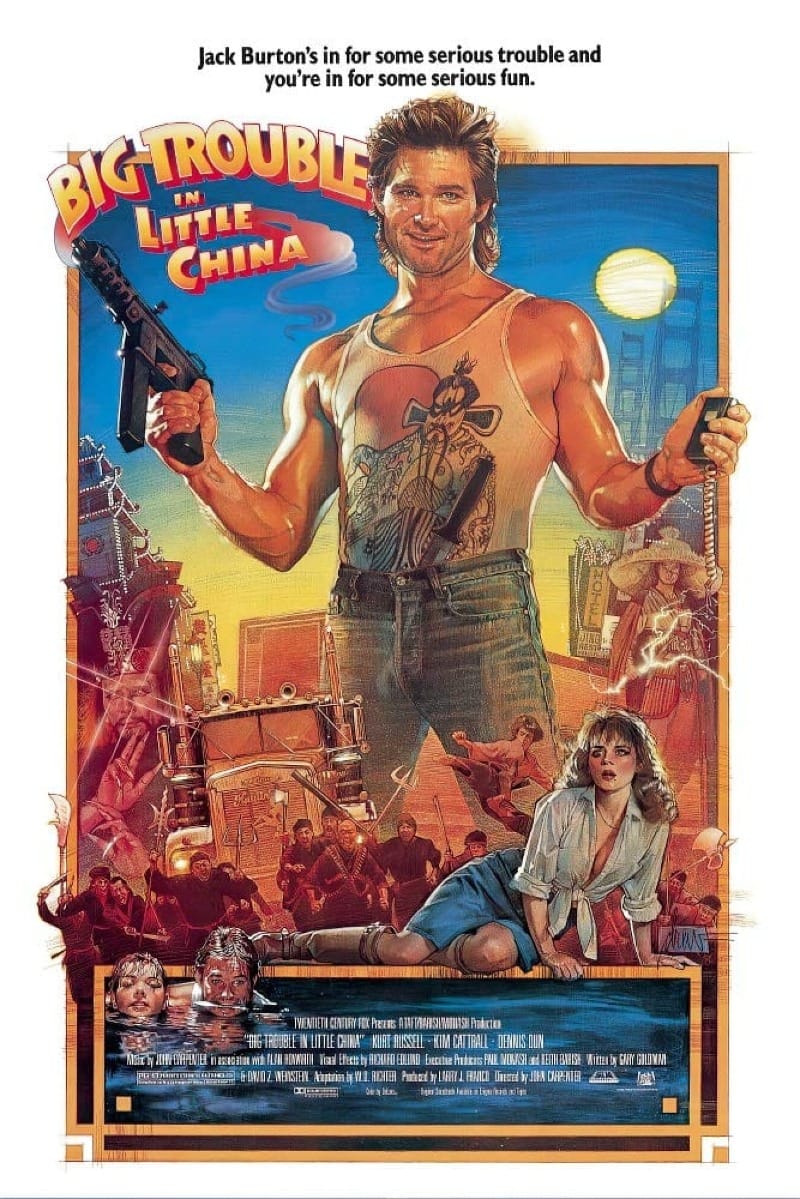
When long-haul trucker Jack Burton agrees to take his friend Wang Chi to pick up his fiancee at the airport, he never expected to land in the middle of a supernatural battle between ancient forces of good and evil for the very soul of San Francisco's Chinatown, but that's exactly what happened...
You just listen to the Pork-Chop Express and take his advice on a dark and stormy night. When some wild-eyed, eight-foot-tall maniac grabs your neck, taps the back of your favorite head up against the barroom wall, looks you crooked in the eye and asks you if ya paid your dues, you just stare that big sucker right back, and you remember what ol' Jack Burton always says at a time like that: "Have ya paid your dues, Jack?" ...Yessir, the check is in the mail.
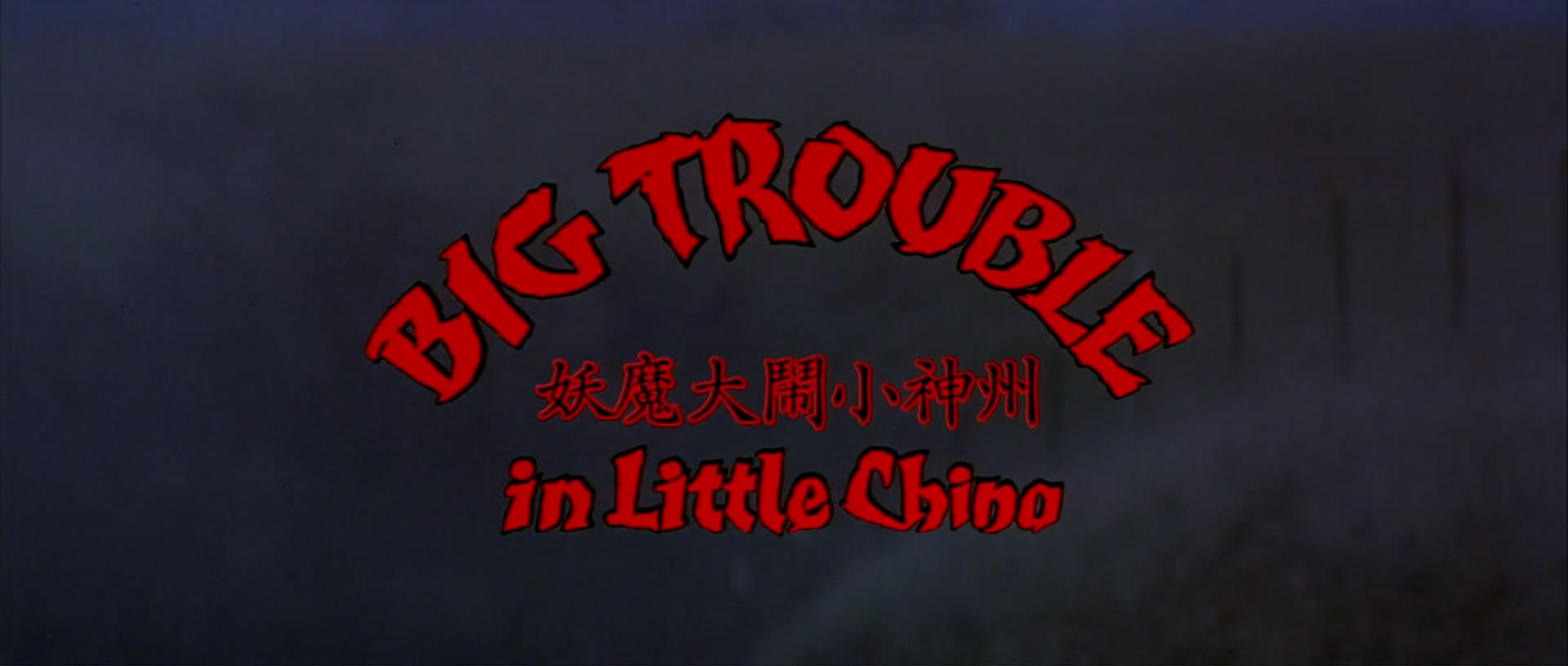
This is me, still posting about my 20 most influential movies. As I’m sure you all know by know, this series is the result of a social media game. The idea was to list 20 movies that greatly influenced you, then post the poster of each movie, one per day, for 20 days, but with no reviews, no explanations, just the posters. I did that, but then I decided that I also wanted to talk about them a little bit...
So I have been.
Big Trouble in Little China is Number 18 on my list.
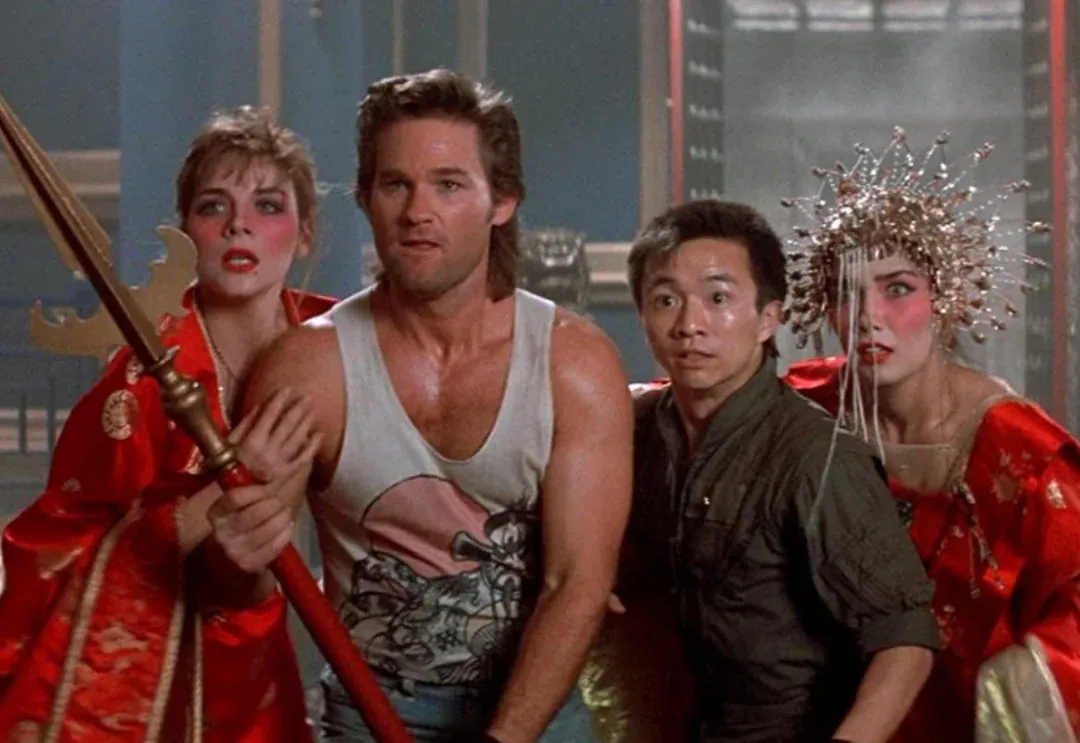
Inspired by modern day wuxia martial arts films out of China, and the myriad Tong Wars of 19th-century San Francisco's Chinatown, first time screenwriters Gary Goldman and David Z. Weinstein initially envisioned Big Trouble in Little China as a Western set in the 1880s. The story would center on the cowboy Wiley Prescott going along with his good buddy, Chinese railroad worker Sun, to meet Sun's fiancée Lotus as she arrives in San Francisco, only for the sorcerer Lo Pan to capture Lotus, and during this, separate Prescott from his horse. The story would then turn into a "Weird West" kind of thing–a genre where the traditional tropes of a Western is mixed with fantasy, horror, and/or sci-fi elements–which is not the most popular of settings when it comes to general Western movie audiences, who are usually the kind of people who prefer their food with as little spice as humanly possible. So the producers and the studios objected to the setting, but the writers were absolutely unwilling to update theie story to a modern day setting, classically overestimating their importance in the whole Hollywood movie-making process, but in their defense, as I mentioned above, they were first-timers...
So they were fired.
Screenwriter and script doctor W. D. Richter, best known for adapting the 1978 Donald Sutherland version of Invasion of the Body Snatchers, as well as for directing the criminally unloved The Adventures of Buckaroo Banzai Across the 8th Dimension (Holy shit, this trailer... how could you not love this movie?), was then brought in to extensively rewrite the script. Richter kept a lot of the original elements, but otherwise rewrote the thing from scratch, turning the Weird West setting into a more modern day version of a classic pulp film, merging the bastard child of the classic "man from the West journeys into the mysteries of the mystical Far East" pulp here idea with some John Wayne doofus type swagger, some classic martial arts movie tropes, and adding a healthy dash of 80s action movie flavoring, to come up with a take that was pretty unique, at least during an era of Hollywood that generally preferred its action films to be more of the muscles and machine guns based variety.
But still... somehow the studio signed on.
Next, the legendary director John Carpenter, the man responsible for such genre classics as Assault on Precinct 13, Halloween, Escape from New York, Christine, and of course, The Thing, amongst many others, was hired on to direct. Carpenter was excited to join, as he had a long love of martial arts films like Five Fingers of Death and Master of the Flying Guillotine, and had always wanted to make his own version of that style of film. So, with everyone now on board and excited and happy and raring to go, Big Trouble in Little China was rushed into production, so that it would be released before the similarly themed Eddie Murphy movie, The Golden Child, hit theatres, which was slated to come out around the same time, because for some reason, people really thought The Golden Child was going to be huge hit.
Both films were box office failures.
The commercial failure of Big Trouble in Little China left Carpenter pretty disillusioned when it came to the Hollywood studio system, and so he returned to being an independent filmmaker. He often cited the experience in interviews as the reason for his vow to never work for the studios again, claiming that the reception of the film was too much for him to deal with, and that he was too old to bother with that kind of stuff even again. And he's not wrong for feeling this way either. Time has proven that, unlike The Golden Child, Big Trouble in Little China is an actually good movie unfairly maligned by mainstream audiences who prefer that all of their entertainment be presented in much the same as their food, rigidly familiar, over-all flavorless, and without any daring, style, or flair.
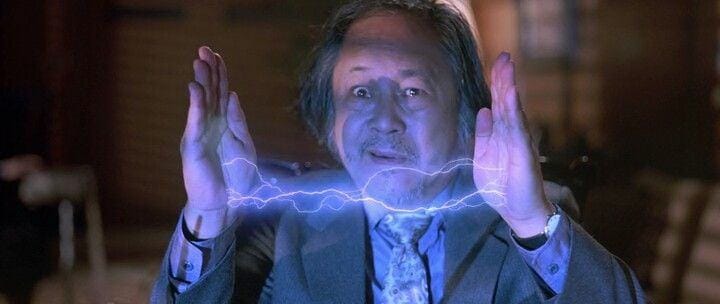
So... The story begins with Egg Shen.
Egg Shen is a tour bus driver in San Francisco's lovely Chinatwon, and he is meeting with a lawyer. The lawyer asks Egg Shen about a man by the name of Jack Burton. He wants to know whether or not Egg Shen knows Mr. Burton's current whereabouts. He informs Egg Shen that he could be in a great deal of trouble if he is withholding information, as half a city block recently exploded in green flame–Green Flame!–and that a lot of people are rightfully upset about this, and that there are people who are saying that Egg Shen was involved, that he may have even been responsible, that Egg Shen is a very dangerous man. But Egg Shen doesn't flinch, shutting the lawyer down, telling him to leave Jack Burton alone, assuring him that we are all in debt to Jack Burton, who showed great courage. The lawyer splutters, demanding an explanation. How can he act as Egg Shen's lawyer without understanding what exactly happened here, because nothing that he's heard so far makes any sense... Ghosts? Monsters? Black magic? How can anyone be expected to believe in any of this?
Because it's all real, Egg Shen assures the lawyer, and then he does some magic, a small bit of magic, because that's how it always begins... very small.
That's when we flashback to meet Jack Burton...
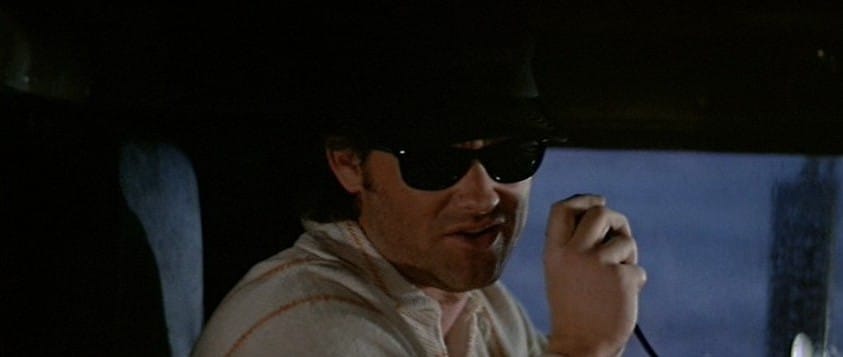
This is Jack Burton at the Pork-Chop Express and I'm talkin' to whoever's listenin'. It's like I told my last wife. I says... Honey, I never drive faster than I can see. And besides, it's all in the reflexes.
Long-haul truck driver Jack Burton blows into San Francisco, and his truck, The Pork-Chop Express, is filled with cargo. After a night of drinking and card-playing while his truck is unloaded, Jack wins big, and his friend Wang Chi needs to pay up. The only problem is... Wang doesn't have it on him right at that moment.
To make sure Wang pays up, Jack accompanies Wang to the airport, as Wang's Chinese fiancée Miao Yin is finally landing today, after the two of them have been apart for years. While they're waiting, Jack meets sexy white lady lawyer, Gracie Law, who is also waiting for someone on the same flight. Gracie is not impressed with Jack. Neither are the local Chinease-America 1980s-coded street gang, The Lords of Death, who get into it with Jack. The gang members are there to kidnap the chinese young woman that Gracie is waiting for, but Jack interferes, and that's how you know this movie takes place in the 80s, as one gang member whips out a butterfly knife while at the airport gate.
In the scuffle, the Lords of Death nab Miao Yin.
Jack and Wang chase the Lords of Death all the way back to Chinatown, but a couple of wrong turns down the wrong alleys and they find themselves suddenly faced with a funeral. This then turns into an all out kung fu battle between two opposing factions of ancient Chinese warrior societies who have been locked in a blood fued for centuries...
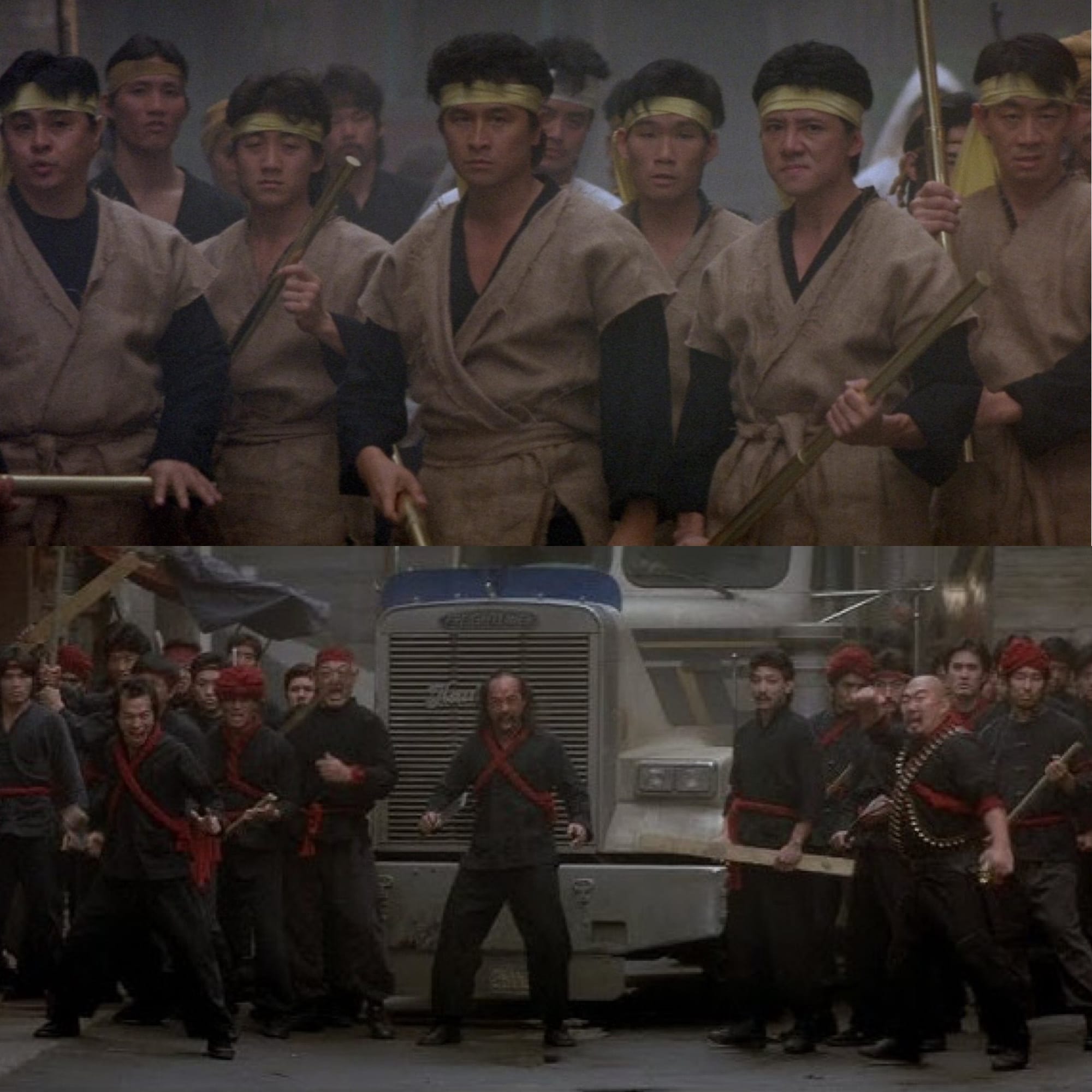
On one side stands the Chang Sings, a noble fighting tong long dedicated to the protection of Chinatown. They are dressed in white tunics and yellow turbins or headbands, and have a super cool way of acknowledging each other. On the other side stand the Wing Kong, an evil fighting tong who are recognized by their black outfits and red turbins and sashes (please note that famous 80s action movie henchmen Al Leong, who had the best wedding annoucement ever, is part of the Wing Kong).
Based out of the Wing Kong Exchange, the Wing Kong are under the sway of the infamous David Lopan, a long-time recluse and criminal power in Chinatown. He is also an evil immortal sorceror cursed to forever be stuck between life and death.
Jack and Wang are caught in the middle.
But things are going all right for the Chang Sing, at least until The Three Storms show up–marial arts masters with elemental and supernatural powers, who are known as Rain, Thunder, and Lightning.
They start slaughtering the Chang Sing.
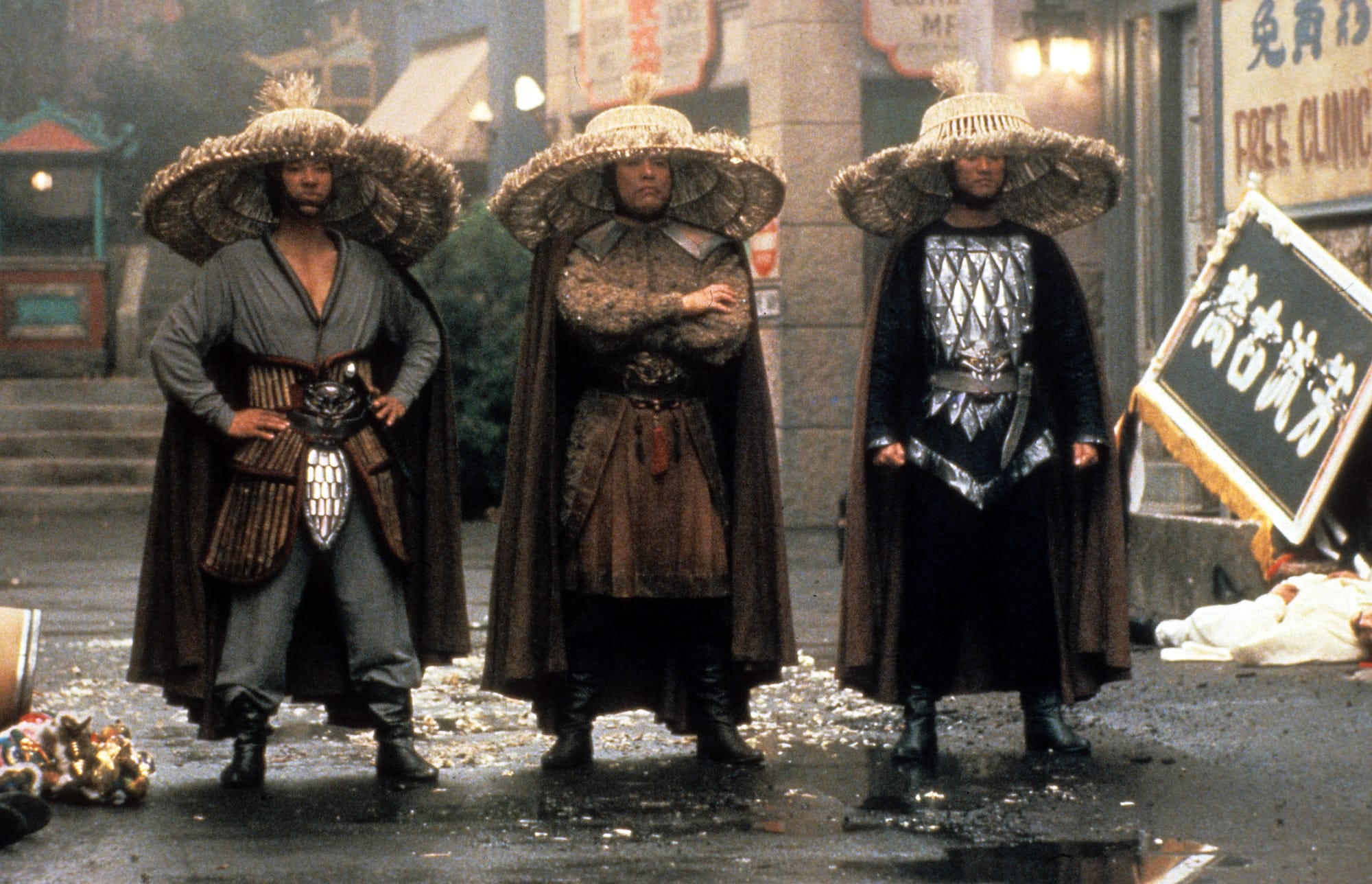
Jack attempts to use his big-rig to ram through the crowd, but that's when a massive man in ceremonial garb shows up. Jack runs him down, and horrified, he exits his truck, only to find the strange man unhurt and glowing with magic. With Wang's help, Jack escapes the fray on foot through the alleys, but in the process, his truck is left behind and stolen.
Back at Wang's restaurant, we meet Gracie Law again, her journalist friend Margo, Wang's friend Eddie Lee, and also Egg Shen, who is not only a tour bus driver, but a local magician, and an authority on the strange magic man Jack ran over with his truck, who turns out to have been David Lo Pan. Needing to free Miao Yin from the Lords of Death, they devise a plan to infiltrate Lo Pan's brothel, with Jack dressed as an average American businessman, as they believe Miao Yin is being held there. Unfortunately, they are beaten to it by the Three Storms, who kidnap Miao Yin and take her to Lo Pan.
Wang tracks them to the Wing Kong Exchange, the front business used by Lo Pan, and impersonate telephone repairmen in order to gain access. Before they leave, Jack tells the others to wait at Wang's restaurant.
Okay. You people sit tight, hold the fort and keep the home fires burning. And if we're not back by dawn... call the president.
They are quickly subdued by the Three Storms. And after being beaten up and tied to wheelchairs, Jack and Wang are taken to meet Lo Pan.
Which Lo Pan? The little old basket case on wheels or the ten foot tall roadblock?
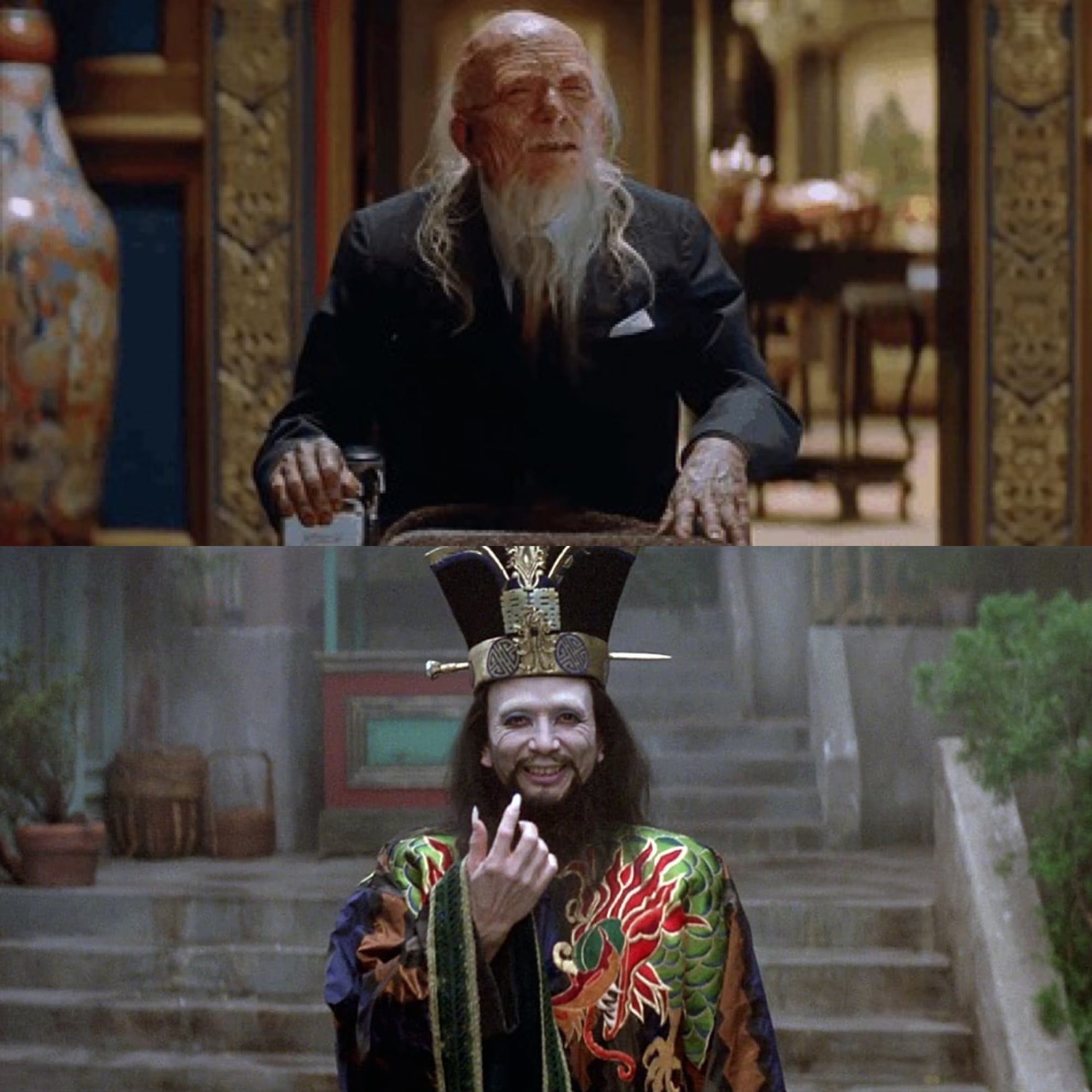
Centuries ago, the evil sorcerer Lo Pan was defeated in battle by the Emperor Qin Shi Huang, who cursed Lo Pan with incorporeality, to be a living ghost haunting the world. He is able to temporarily obtain a decrepit body by supplication to the gods, but in order to fully break the curse, he must marry a girl with eyes like jade, and then sacrifice her to the gods. Miao Yin has green-eyes, so Lo Pan intends to marry her. That's when Gracie, Margot, and Eddie show up, looking to save Jack and Wang by making a very public scene in the Wing Kong Exchange front offices. This really upsets Lo Pan, and soon enough, everyone is captured.
The group manages to escape, but a Yeren–which is basically the Chinese version of the Yeti or Bigfoot–recaptures Gracie before she can escape. Taken to Lo Pan, he notes that Gracie also has green eyes, and decides to play Marry, Fuck, Kill, but with only two women, so there may be some overlap on the middle choice.
Back at Wang's restaurant, Jack and the others regroup with the Chang Sing and Egg Shen, and since they can't allow Lo Pan to break his curse, they decide they're gonna take the battle to him. Using ancient underground tunnels far beneath the streets of Chinatown, they return to Lo Pan's headquarters. On the way, Egg pours them a potent potion, and they all feel good. Pretty good, in fact. Not scared at all. They feel kind of invincible, with a very positive attitude about how things will go. Although, it does feel a little hot in the room suddenly.
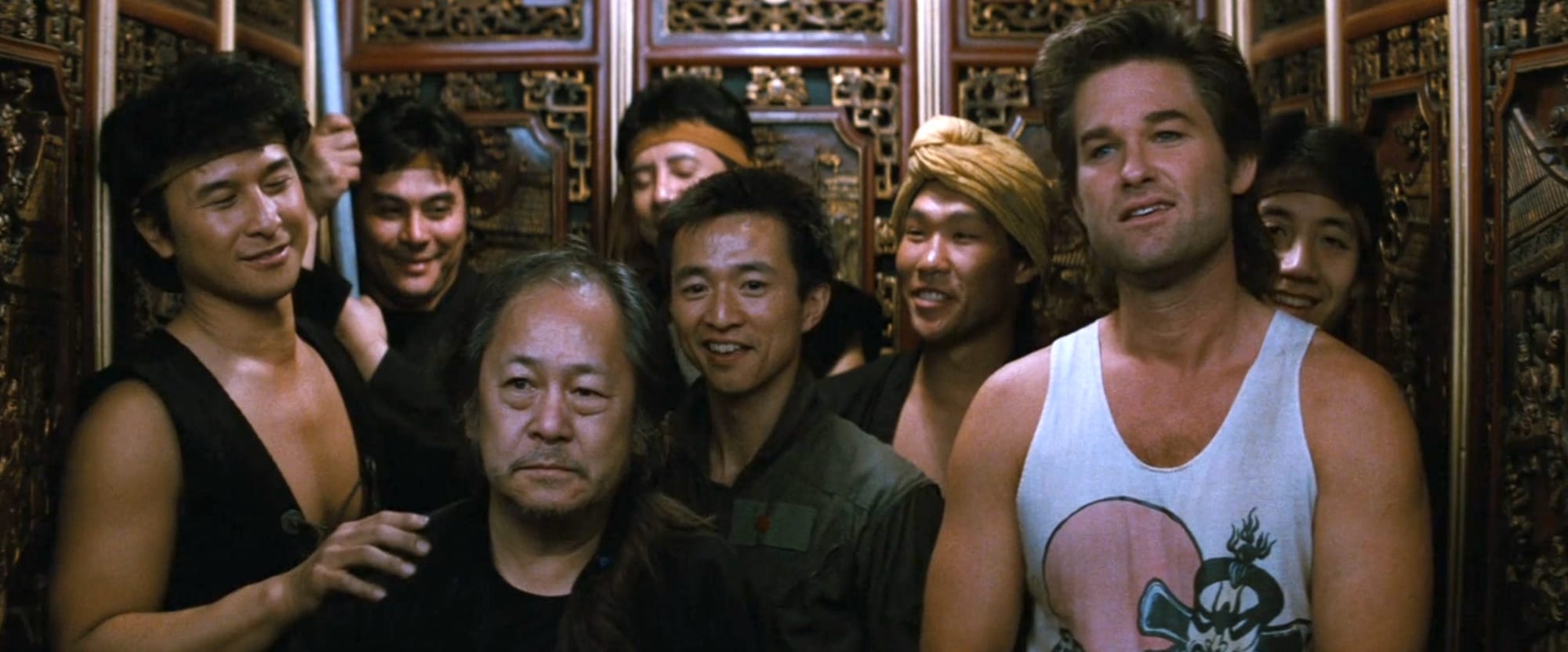
Entering Lo Pan's very tastefully decorated temple area, Jack, Wang, Egg Shen, and the Chang Sing interrupt the wedding and everyone leaps into battle. Wang takes out Rain in a high flying sword fight, while the Chang Sing run through the Wing Kong, and Egg Shen defeats Lo Pan in a sorcerer's, forcing the evil demon to retreat with Gracie and Miao Yin. Jack is unconcious through most of this, after shooting the ceiling and then being knocked out by the falling debris.
Then, while Wang fights Thunder hand-to-hand. Jack and Gracie chase Lo Pan, who has regained his corporeal form by consuming some of Miao Yin's blood. Jack throws a knife at Lo Pan and misses. Lo Pan throws the knife back at Jack, who catches it by accident and throws it back, striking Lo Pan in the forehead, killing him. Upon finding Lo Pan dead, Thunder swells up with rage and explodes.
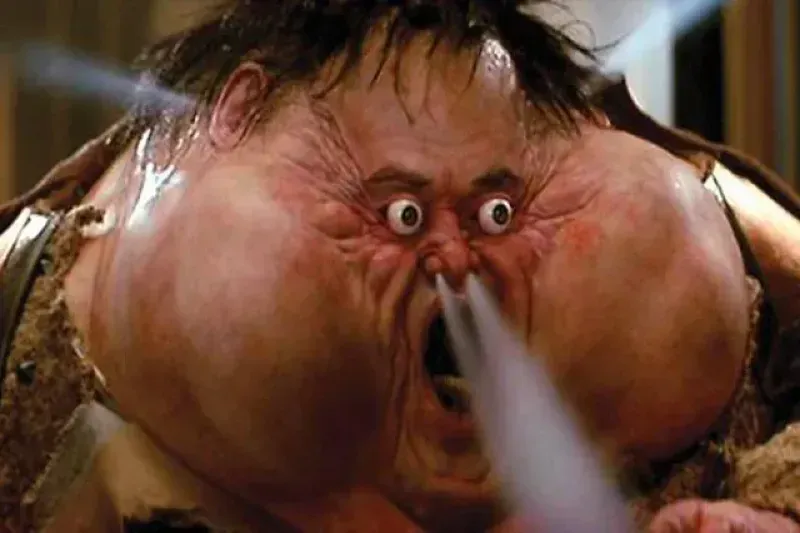
Jack, Wang, Gracie, and Miao Yin try to excape, but are blocked by Lightning. Luckily, Egg Shen drops a Buddha statue on his head, after making the difficult climb to a higher floor. They find the Pork Chop Express, ram their way to freedom, and head back to Wang's restuarant.
Everyone celebrates with chinese food and beer, which is maybe the best way to celebrate anything. Wang and Miao Yin will be married soon. Eddie might ask out Margo. And with Lo Pan defeated, Egg Shen plans on taking a vacation. Gracie and Jack almost decide to stick together, but in the end, Jack leaves alone.
Sooner or later, I rub everybody the wrong way.
Having shook the pillars of Heaven, and now back on the open road, Jack Burton drives off into the dark and stormy night, just another day in the life of adventure that is long-haul trucking. However, unbeknownst to Jack, the Yeren has survived the battle and has stowed away on the Pork Chop Express...
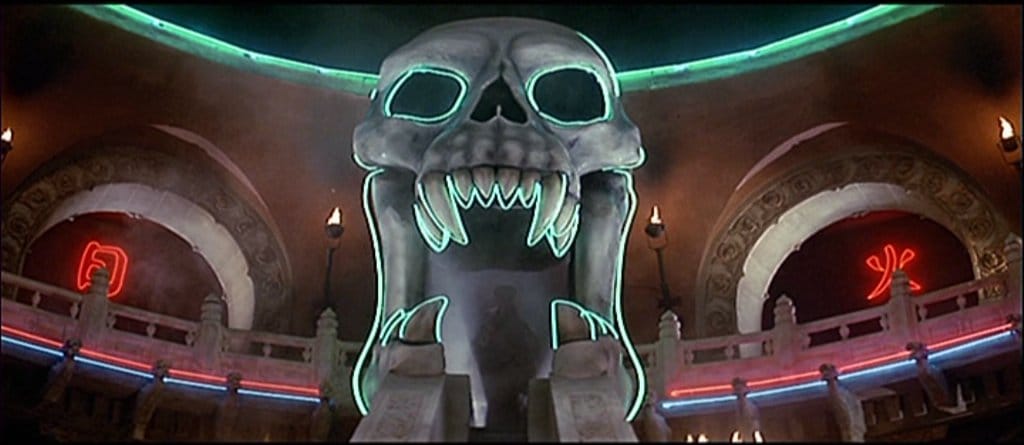
Roll credits with one of the worst end credits song ever.
Fun Fact... the end credits song Big Trouble In Little China (End Credits - Album Version) was performed by the group The Coup De Villes, a "band" that consisted of director John Carpenter, second-unit director, Tommy Lee Wallace, and fellow screenwriter, Nick Castle. The song is primarily performed by Carpenter, except for the backing vocals by Castle.
It's so awful, it's actually kind of amazing.
But despite the rest of the film being actually good, and getting generally positive-ish reviews at the time, Big Trouble in Little China was an undeniable commercial failure. Opening in over 1000 theaters on July 2, 1986, it only grossed $2.7 million in its opening weekend (with five-ish bucks of that happily coming from me), and then went on to get $11.1 million total in North America. Even with its relatively small budget of $20-ish million, that is undoubtedly a bomb. And once James Cameron's Aliens was released about two weeks later, it was all over for this film, time to fade away. But that said, the film did go on to eventually find its audience on home video over the years, and it has since become a cult classic.
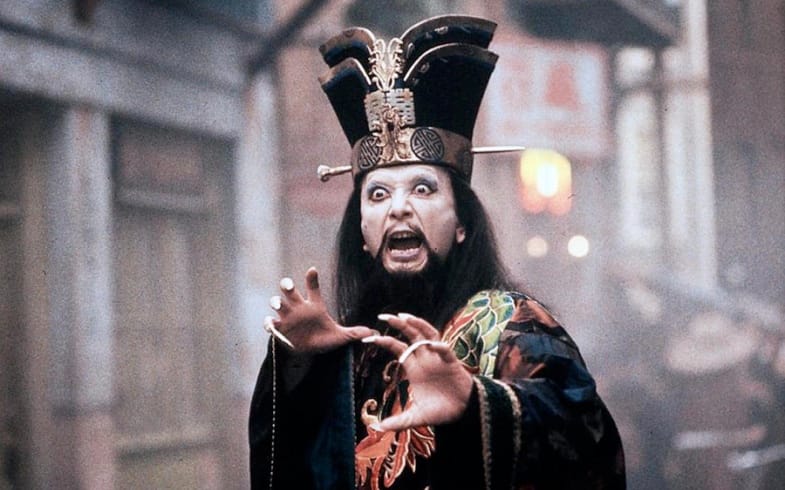
It wasn't all good times and kung fu though.
White people looking for a cookie will often use this film to demonstrate their social awareness, and call it out as racist, but what they're actually doing is letting us all know that they're not capable of engaging with art beyond a mere surface level, and that perhaps they have never even actually seen the film, because they're not actually being insightful when they say this, they're just being dumb assholes.
Because while it's true that, in lesser hands, Big Trouble in Little China could've easily been the story of a presumptious and entitled white savior blundering their way into a foreign culture in blissful ignorance, all while making a racist jokes out of everything they aren't familiar with, and proving that ultimately, the white man of the Western world simply does it better–much like in those one scenes that have no reason to be there, and yet still appear in fucking Licorice Pizza–that's not what this film is about. Yes, there are Yellow Peril elements in this film, and Asian stereotypes too. The film does exoticize and caricaturize Chinese culture. But the point is not to mock any of those things, it's to mock the white savior trope that is commonly found in films like Dances with Wolves, or the Last Samurai, or Green Book, or The Blind Side, or Avatar, or on and on and on. The story may center on Jack Burton, and the audience may think of him as the hero because of all his Big American bravado, but it's clear from the start of the film that Burton is actually Wang Chi's inept sidekick.
And to be fair, the poster doesn't obviously reflect this if you haven't seen the movie. It clearly does if you have seen it, sure, but if you haven't, you might feel like you have some opinions on the film, and if you have no shame about speaking with authority despite your staggering ignorance, you might voice those opinions, and that's basically the problem with America. But in the poster's defense, posters are marketing, and marketing is a separate thing from the actual art.
Regardless, this is the actual intention of the picture, as John Capenter has always seen the film as an attempt to subvert traditional "Green Hornet and Kato" type of set up, often describing Jack Burton as the side kick who thinks that he's a leading man. This is why, despite his swaggeriing braggadocio, he's only ever portrayed as a bumbling fool. In the big end fight, he knocks himself unconscious before it even begins, all while Wang Chi is kicking ass all over the place. Wang gets the girl too. Jack does not. According to legend, this entire idea flummoxed the studio, which is why they had Carpenter insert the opening scene with Egg Shen and the lawyer, to mollify white audiences and assure them that Jack Burton is a hero.
Now, obviously this inserted scene somewhat kneecaps the film's intent, having one of the Chinese-American heroes venerate the white hero before the film even starts, giving Jack all the glory of saving the world, but sadly, Hollywood is first, last, and always a business, and they know the awful truth about their mainstream white American audience. And that truth is the same thing that those shitty scenes in Licorice Pizza showed us... that mainstream white American audiences are more ready to see things from a racist point of view then they are from a nuanced one, regardless of the filmmaker's intent. As a result, since white defaults white, the studios don't want to upset the demographic that they see as their main money source, and hence... the pandering to their shitty points of view.
Such is the way of things.
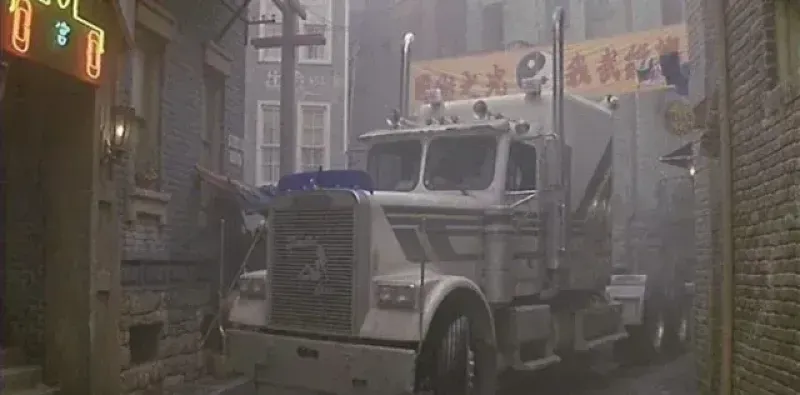
But all that shit is really just for the people who are too far up their own butts. More than anything else, Big Trouble in Little China is meant to be a good time at the movies, and that's exactly what it delivers.
Raiders always comes first, but I think this was the first action movie with a sarcastic tone that I encountered as older child when I was more able to appreciate that kind of humor, and I loved it. Jack may be a bumbling fool, but he's also very put-out by this entire situation, and lets everyone know it. He doesn't know what's going on, it's all very scary and confusing, and it frustrates the hell out of him, and that was hilarious to me. I also loved that there's no lag in this film, no middle part where everyone sits around too much. It's all forward momentum, like an extended chase sequence, with an energy that is similar to the Big Lebowski, where the main character is more pulled along by the story's events, like they're caught in the fast-moving currents of a river, rather than being a driving force. It's a funhouse ride of a film, quick and to the point, while delivering plenty of thrills and laughs. People underestimate how difficult it is to pull off that kind of film, a fun, quick, exciting little actioneer. If there were still video stores, I'd suggest strolling the racks of the action section to get a sense of how littered the genre is with the films that tried to do exactly what Big Trouble in Little China does so easily, but completely failed.
Plus, like a nod to Raiders, Russel brings an Indiana Jones feel to Jack Burton, that kind of heroism where he's not sure what he's doing, but he's doing it anyway, and all while showing the world a macho display of self-confidence in order to mask his worry that this shit may not work out. Couple that with Kim Cattral, back when she was the Queen of the 80s B-movies and not yet a glamourous NYC vamp, who gives Gracie Law a very Howard Hawks style of a witty, tough talking, take no shit dame, and you've got a Hepburn and Tracy style chemistry going on between them during all this very 80s action movie fantasy nonsense. And on top of all that, you've got Minneapolis' own, the legendary and award-winning actor, James Hong playing Lo Pan, and just devouring all the scenery with his iconic performance.
It's fantastic.
Big Trouble in Little China wasn't my first experience with wuxia and its amazing wire-fu. My first experience was the Shaw Brothers epic, Five Elements Ninjas, which, much like Buckaroo Banzai, has an amazing (and also kind of long) trailer, and I don't know how you could not love it, but I digress... My point is, this film was my first encounter with those ideas in an American setting, and much like how I loved the way Noah embraced the post-apocalyptic fantasy and mysticism of the world of the Old Testament, I loved seeing this skewed vision of the expected too.
And of course, like with Highlander, I loved the hidden world aspect. The whole idea that there's an entirely different world back amongst the alleys of Chinatown, a world of black magic, wild kung fu fights, and strange creatures, all right around the corner from the "real" world...? And all with little explanation for us outsiders?
I love that whole set-up.
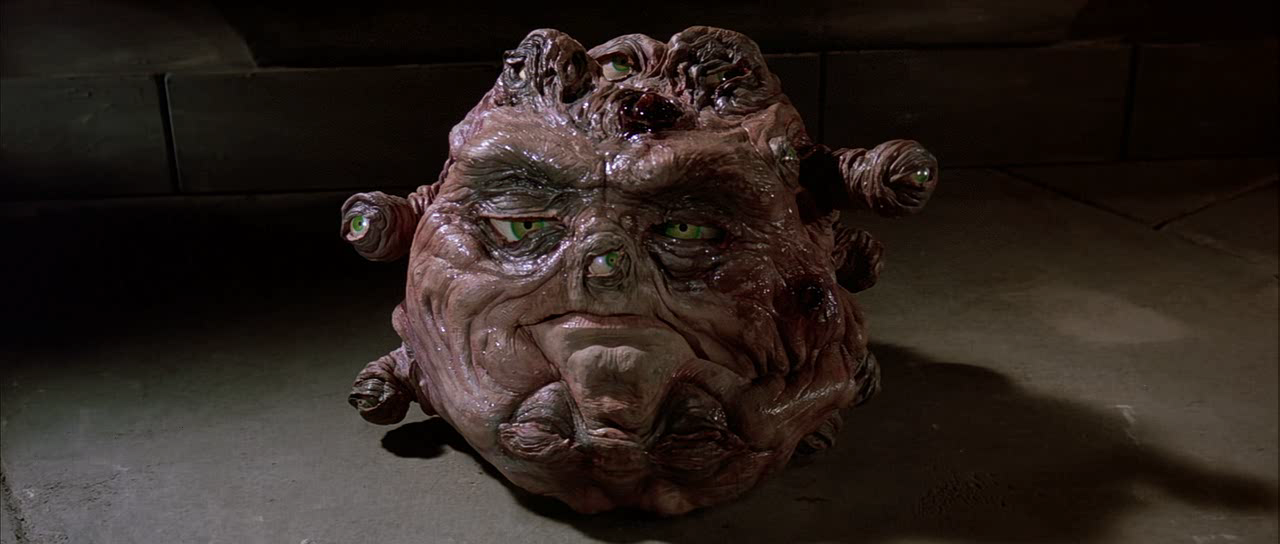
Once voted by Empire magazine as the 430th greatest film in their "500 Greatest Movies of All Time" list, Big Trouble in Little China is pure fun in all the ways that action cinema of the 1980s was good. This is one of John Carpenter's greats, a film where he cuts loose, and revels in the kind of cinema that he loves... Kung fu films, horror, creature effects, it's a mish-mash of pieces that blend together into a cult classic action-comedy that is one of his most unabashedly fun movies.
Just remember what ol' Jack Burton does when the earth quakes, and the poison arrows fall from the sky, and the pillars of Heaven shake. Yeah, Jack Burton just looks that big ol' storm right square in the eye and he says, "Give me your best shot, pal. I can take it."
Big thumbs up.
